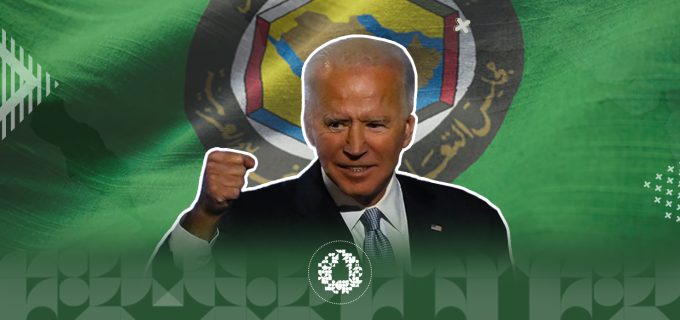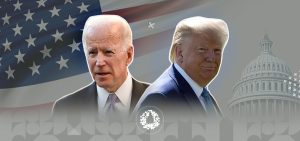Following the presidential victory by the Democratic candidate, Joe Biden, it seems that the Gulf states will witness several changes in various files, be it related to their domestic affairs or to their regional relations. The previous US administration, led by former President Donald Trump, had represented a turning point for countries of the Gulf Cooperation Council (GCC) because Trump clearly sought to serve his allies in the region by reducing and blocking Iranian influence. He did this by withdrawing the US from the Iran Nuclear Deal in 2018, as well as imposing economic sanctions. Indeed, the Gulf crisis has hit the Gulf system politically, socially, and even on a security level, leaving the door open for Iranian influence for the upcoming stage, particularly because the Peninsula Shield Force of the GCC is no longer able to confront any common enemy from outside the region.
The intensity of the Gulf disputes was not limited to their regional framework, but spread into international scenes, and became one of the most important issues in international courts and the US election campaign. Moreover, it has fuelled the disputes over the relationship with Iran, Turkey, and Israel, and the human rights file in the Gulf. Thus, the Gulf disputes are linked to all the hot files in the region, which reinforced the necessity to study the forecasted repercussions of the US relations on the Gulf states following Biden’s victory, as well as the related files in the region. Indeed, this is what this paper will discuss, drawing out forecasted predictions.
US policy towards the Gulf states; between the Republicans and Democrats
Both the Republican and the Democratic parties proceed from the same principle when it comes to US foreign policy, linked to two main factors: national security and economic interests. However, they differ in the means and approaches adopted to achieve these goals. The Republicans focus on the base of common gains versus flexibility in managing problematic files in the Middle East. They then use various means, including those that contradict the values that underlie the US’s role as a world leader. Meanwhile, the Democrats focus on the necessity of balancing between achieving both the security and economic interests of the US, without interfering with the values of democracy and human rights that the US adopts as its slogan to create its influence worldwide.
These discrepancies became clear through the policies of successive presidents of the US administration, especially in recent years. Indeed, outgoing US President, Donald Trump, adopted all the means that enabled him to achieve economic precedence in the state budget without paying much attention to the reputation of the US. Ultimately, Trump believes there is no value in protecting democratic values abroad without recompense. Meanwhile, many experts suggest that Joe Biden will restore the role of the Democrats and continue the projects initiated by Obama in searching for a realistic solution to the most pressing problems in the Middle East; the most important of which are the Iranian file and the Palestinian issue.
The Gulf file in the US election campaigns
For many of the Gulf states, the Trump era was golden. Trump took unprecedented steps with regard to the Gulf states’ traditional enemy – Iran. As soon as he came into power, he rushed to withdraw from the US agreement in 2015; then he made a unilateral decision without consulting local and regional allies on the order to assassinate Qasem Soleimani; then he followed that by imposing harsh sanctions on Iran. This was a great relief for the Gulf states.
However, he did not focus heavily on foreign policy issues during his presidential campaign. Rather, his focus was on domestic challenges as they were the area of the duel between him and his Democratic counterpart, Biden. However, many political analysts suggested that if Trump wins the elections, his policy towards the Gulf states would not change. Rather, his efforts would continue to implement the last steps in finalizing the so-called ‘Deal of the Century. In return for the financial profits he received from the arms deals with the Gulf states, he preferred to continue the policy of maximizing his gains in exchange for a policy of flexibility and overlooking of many files in these countries, including the file of freedoms and human rights.
Meanwhile, analysts suggest there are clear trends for Biden, as he demanded a return to democratic party values in his election campaign, and to reform the human rights and freedoms situation in the Gulf states. Therefore, the Gulf should expect to face some challenges under the new administration, including pressures that may hinder arms deals, and the possibility of being hit economically because of Biden’s environmental trends, considering they are mainly oil-dependent.
A reflection of Biden’s victory on the Gulf’s security file
Although countries of the GCC managed to achieve a high degree of military coordination in several areas since 1981 under the slogan of establishing a defense coordination structure, followed by the signing of the joint Gulf Defence Agreement in Manama in December 2000, they were unable to coordinate their efforts in an effective manner. This was because of several challenges, including the absence of an institutional structure aimed at attaining collective comprehensive unity, as well as the delay of many projects promoting this unity, such as the single currency and single market project. Furthermore, the GCC, due to its strategic position, is currently facing many security challenges, especially after the increase of Houthi attacks on key areas and oil installations.
Moreover, the security strategy of military disengagement of the US in the region increases the Gulf states’ concern as the US directs its focus towards China and the East Asian countries. This prompts it to rely on its allies to maintain peace in the region.
Trump began the policy of military disengagement by linking it to the necessity of bearing military expenditures. It appears from Biden’s speeches that he will continue the same policy of disengagement, but this time, by restoring the diplomatic role of the US in the region.
The nuclear file
Iran’s moves present the most flagrant threat facing the Gulf states, and although the Trump administration sought to weaken Iran’s moves from an economic and military standpoint, the US did not respond when Iran targeted Aramco after the assassination of Qasem Soleimani. Moreover, the statements and directions of Biden heighten the Gulf states’ concern as Biden seeks to bring Iran back to the negotiating table regarding its nuclear program. Indeed, Iran’s possession of any nuclear projects is a threat to the Gulf states and the security of the region as a whole. Additionally, bringing Iran back to the negotiations table means sanctions will be lifted, and this means restoring its economic activity and its ability to finance its arms and proxies in the region.
A reflection of Biden’s victory on the Gulf crisis
The continuation of the Gulf crisis further complicates the scene of interests and alliances in the region. Given that the US administration intends, to some extent, to rely on its regional allies to solve the existing conflicts in the region, the Biden administration will strive to bring the Gulf parties back to dialogue for a solution to the crisis that dispersed the role of the allies in facing the Iranian threat. It seems that such a possibility is very likely given that Biden announced his desire to reactivate America’s role in the region and at a world level, through the activation of regional and international partnerships. Thus, some Gulf countries, such as Bahrain and the UAE, rushed to normalize with Israel in order to find a strong ally to support it in its positions regardless of the changes that will affect the US administration. This indicates the possibility that the Gulf crisis will not witness a breakthrough in the coming period. However, Biden’s victory may be reflected in other files related to the Gulf states. These include:
Freedoms and human rights
In recent years, critical voices have increased within the US administration regarding reports on human rights and freedoms in the Gulf states. Indeed, the annual Country Reports on Human Rights Practices by the US State Department criticized the six Gulf countries on the subject of freedoms and rights. Given Biden’s principal orientations, the file of freedoms and human rights may witness improvements since it will be a priority for the new US President. However, many analysts suggest that the relationship between the US and the Gulf states cannot be severed because of this file given the size of the strategic interests that bring the US together with these entities. However, they will not be as strong as they were during Trump’s rule.
Meanwhile, it seems that despite Biden’s keen interest in the file of freedoms and rights, the domestic challenges on the back of the Corona pandemic will undoubtedly dominate the attention of the new President.
Normalization with Israel
From an Israeli perspective, Trump is the most accomplished president with regard to the Palestinian issue. During his rule, the US embassy was moved to Jerusalem, which was recognized as the capital of Israel; Israel’s sovereignty over the Golan Heights was also recognized; US aid to the Palestinian people and its leadership was severed; and Trump’s rule was concluded with the persuasion of three Arab countries to declare normalization with the Zionist state, namely the UAE, Bahrain, and Sudan.
Despite Biden’s statements that he agreed with such positions as steps on the road to peace in the region, many experts assert the return of the Democrats to power will mean the US administration’s rapprochement with the Palestinian Authority, and this will greatly affect the normalization campaign. Thus, many Arab countries will refrain from normalizing as an option to achieve stability in the region, and it is expected that the ‘Deal of the Century’, which was promoted since the beginning of Trump’s rule, will be postponed.
Economy
The impact of Biden’s administration will not only be limited to security and political aspects but will also have a major impact on the economic side. Biden focused on climate and environmental issues in his election speech, promoting green investments and shifting towards renewable energy. Moreover, he spoke of lifting support and facilities from the shale oil industry; launching a program that achieves net-zero carbon emissions by 2050; and investing $1.7 trillion during his presidency to provide environmental alternatives to renewable energy. He noted that it will not be an easy feat to convert directly to clean energy, but rather, there will be a price that oil countries will bear at a time of increasing challenges in traditional energy worldwide, especially with the Corona crisis and the weak global demand for oil.
Furthermore, Biden adopts the vision of the need to return to negotiations with Iran over its nuclear program. This, of course, will include easing or removing sanctions, which will have a significant impact on increasing global oil supplies, adding about two million barrels of oil per day in a market that is already suffering from oversupply. Furthermore, given that most Gulf countries depend on oil for their economy, they will be greatly affected by any decision taken by the new US administration.
Further to these challenges, the Gulf states will be affected if strict laws are applied to their sovereign funds, as the Democrats are more concerned with the issue of transparency of sovereign funds and their investments than the Republicans, whether the motives were technical, political, or strategic. It is known that Gulf Sovereign Wealth Funds, which are close to the value of $2 trillion, are generally limited in transparency according to the Santiago Principles.
Concurrently, the US Securities and Exchange Commission considers that some sovereign funds (the Gulf, China, and Russia) may be subjected to abuse of their official links in order to obtain information not available to the public, or resisting cooperation in security issues in which their investments are a party.
In general, Democrats fear that these countries will be involved in corruption or suspicious dealings, as well as the fact that these funds enter political accounts in a way that threatens national security. They also fear that they are used as a cover for undisclosed Chinese or Russian investments in the Western world, especially since investments of Gulf sovereign funds are concentrated in finance, banking, and oil sectors of high value in Western and European economies. Therefore, this economic file may be among the files Biden focuses on during his rule.
Conclusion
There is no doubt that Biden’s arrival will cast a shadow over the geopolitical situation in the region, including the relationship with the Gulf states. This will be reflected in many urgent files that have not been decided upon during Trump’s rule, whether it is the Yemen war or the rights, freedoms, and political detainees’ file. Regarding the Iran file, Biden’s victory means returning to the negotiating table with Iran, but many experts suggest that the numerous domestic challenges will preoccupy Biden in a way that may not affect much of the political and security changes imposed by the Trump administration, meaning that many decisions may not be undone, especially with regard to the Palestinian issue. Furthermore, the return of negotiations with Iran will not necessarily be based on previous joint work agreements. Rather, Biden may benefit from Iran’s weakness to amend many of the conditions in the previous agreement.
It seems that Biden’s preoccupations will not prevent him from using his powers to limit the US’s candidness to the Gulf countries, especially with regard to arms deals, and the military disengagement policy the US recently adopted, as well as the impact of media and political pressure regarding freedoms and human rights. These may make the US-Gulf relations lukewarm, but they will not be severed completely due to existing strategic interests.





